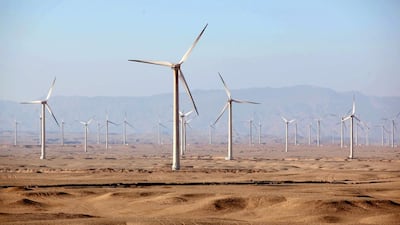Governments across the Middle East and North Africa are increasingly realising that swift change is needed to reduce electricity shortages, and they have begun to embrace green energy as one potentially attractive option.
But for the industry to take off, it needs a lot more support.
States need to enact transparent regulations for the power sector. Those will encourage private investment, which is vital given the budget crunches facing many governments in the region. Officials also need to embrace partnerships with the private sector, which has the expertise to make major projects a reality.
Countries must also beef up their power transmission grids, because when renewable energy projects are up and running, the electricity needs somewhere to go.
Mega projects aren’t the only way to promote sustainable energy. At the micro level, there is strong demand among smaller business for eco-friendly technology to be deployed at the enterprise level.
Most entrepreneurs, though, can't afford those investments without loans and other forms of financing. So it's important that banks see the growing appetite for investments in renewable energy and provide loans tailored to small businesses. Lenders in Lebanon and Jordan have begun to do exactly that, and their early returns have been good.
Environmental and fiscal sense
Unlike conventional fuels, renewables don’t emit either conventional air pollutants or carbon dioxide and other greenhouse gas emissions that contribute to climate change.
That is especially important in the Middle East and North Africa, which is vulnerable to climate change. Some experts believe that even minute environmental changes could trigger droughts with the potential to spark a water crisis and devastate industries including agriculture and tourism.
In the past, the high cost of renewable energy technology, like solar panels and wind turbines, made many investors wary of renewables. But that calculus is changing.
The balance is expected to swing further in favour of renewables if the price of fossil fuels continues to rise and if carbon taxes, or similar measures, are adopted.
Over the long term, embracing renewables could be a boon for governments, many of whom have been forced to tighten their belts. Right now, energy is heavily — and quite unsustainably — subsidised across the Middle East and North Africa.
These subsidies simply cannot last. That is part of the reason why leading oil exporting countries including Saudi Arabia, which for decades have been synonymous with oil production, have begun investing heavily in solar and other renewable energy projects.
Investment opportunities
Many governments have issued aggressive targets for renewable energy, which could mean a great opportunity for investors.
Saudi Arabia has unveiled an ambitious plan to rely on renewable sources for 20 per cent of its energy demands by 2020.
Egypt has set the same targets and is aiming to generate 12 per cent of all power from wind, 6 per cent from hydro plants and 2 per cent from the sun.
Morocco has announced a national solar plan to generate 2 gigawatts (GW) by 2020.
In Pakistan, major hydroelectric and wind power projects are underway, and the country is brimming with potential for others.
Jordan, blessed with strong winds and sunny days, is examining 37 potential renewable energy projects, and is expected to reach deals with a host of private developers in the near future.
The sector could be a boon for investors because the country relies mostly on expensive, imported fossil fuels to generate power, making renewables cost competitive.
Renewable energy would also help nations to improve their energy security. There are more than 100 non-hydro renewable energy projects in the pipeline across the Middle East and North Africa, and together they’re expected to produce 7.5GW of power. That’s a nearly five-fold increase over what’s around now.
Over the next few years, the private sector can play a big role in further realising the potential of the industry.
That will be a bitter pill to swallow for many governments. But with the right policies in place, partnerships with the private sector will emerge, funding mobilisation will take place, and blackouts may no longer be a regular part of summer in much of the region.
Mouayed Makhlouf is the director for the Middle East and North Africa at International Finance Corp, which is part of the World Bank Group

